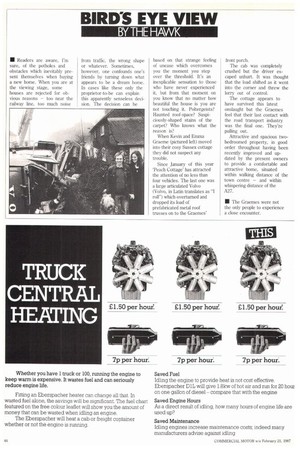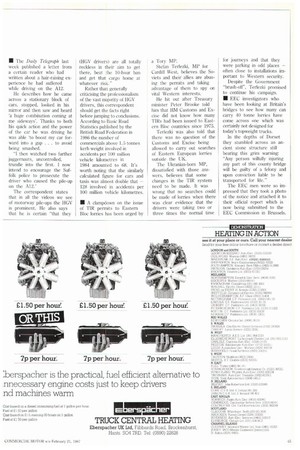• Readers are aware, I'm sure, of the potholes and
Page 46

Page 47

If you've noticed an error in this article please click here to report it so we can fix it.
obstacles which inevitably present themselves when buying a new home. When you are at the viewing stage, some houses are rejected for obvious reasons — too near the railway line, too much noise from traffic, the wrong shape or whatever. Sometimes, however, one confounds one's friends by turning down what appears to be a dream home. In cases like these only the proprietor-to-be can explain this apparently senseless decision. The decision can be based on that strange feeling of unease which overcomes you the moment you step over the threshold. It's an inexplicable sensation to those who have never experienced it, but from that moment on you know that no matter how beautiful the house is you are not touching it. Poltergeists? Haunted roof-space? Suspiciously-shaped stains of the carpet? Who knows what the reason is?
When Kevin and Emma Graeme (pictured left) moved into their cosy Sussex cottage they did not suspect any trouble.
Since January of this year 'Peach Cottage' has attracted the attention of no less than four vehicles. The last one was a large articulated Volvo (Volvo, in Latin translates as "I roll") which overturned and dropped its load of prefabricated metal roof trusses on to the Graemes' front porch.
The cab was completely crushed but the driver escaped unhurt. It was thought that the load shifted as it went into the corner and threw the lorry out of control.
The cottage appears to have survived this latest onslaught but the Graemes feel that their last contact with the road transport industry was the final one. They're pulling out.
Attractive and spacious twobedroomed property, in good order throughout having been recently improved and updated by the present owners to provide a comfortable and attractive home, situated within walking distance of the town centre — and within whispering distance of the A27.
• The Graemes were not the only people to experience a dose encounter. • The Daily Telegraph last week published a letter from a certain reader who had written about a hair-raising experience he had suffered while driving on the Al2.
He describes how he came across a stationary block of cars, stopped, looked in his mirror and then saw and heard 'a huge combination coming at me sideways'. Thanks to both his quick action and the power of the car he was driving he was able 'to boost my car forward into a gap . . . to avoid being smashed.
"I then watched two further juggernauts, uncontrolled, trundle into the first. I now intend to encourage the Suffolk police to prosecute the driver who caused the pile-up on the Al2.'
The correspondent states that in all the videos we see of motorway pile-ups the HGV is prominent. He also says that he is certain "that they (HGV drivers) are all totally reckless in their aim to get there, beat the 10-hour ban and get that cargo home at whatever risk."
Rather than generally criticising the professionalism of the vast majority of HGV drivers, this correspondent should get the facts right before jumping to conclusions. According to Basic Road Statistics published by the British Road Federation in 1986 the number of commercials above 1.5 tonnes kerb weight involved in accidents per 100 million vehicle kilometres in 1984 amounted to 68. It's worth noting that the similarly calculated figure for cars and taxis was almost double that — 128 involved in accidents per 100 million vehicle kilometres.
• A clampdown on the issue of TER permits to Eastern Bloc lorries has been urged by a "rory MP.
Stefan Terlezki, MP for Cardiff West, believes the Soviets and their allies are abusing the permits and taking advantage of them to spy on vital Western interests.
He hit out after Treasury minister Peter Brooke told him that HM Customs and Excise did not know how many TIRs had been issued to Eastern Bloc countries since 1975.
Terlezki was also told that there was no question of the Customs and Excise being allowed to carry out searches of Eastern European lorries outside the UK.
The Ukranian-born MP, dissatisfied with those answers, believes that some changes in the TIR system need to be made. It was wrong that no searches could be made of lorries when there was clear evidence that the drivers were taking two or three times the normal time for journeys and that they were parking in odd places — often close to installations important to Western security.
Despite the Government "brush-off", Terlezki promised to continue his campaign.
• EEC investigators who have been looking at Britain's bridges to see how many can carry 40 tonne lorries have come across one which was certainly not designed for today's topweight trucks.
In the depths of Dorset they stumbled across an ancient stone structure still bearing this grim warning: "Any person wilfully injuring any part of this county bridge will be guilty of a felony and upon conviction liable to be transported for life."
The EEC men were so impressed that they took a photo of the notice and attached it to their official report which is now being submitted to the EEC Commission in Brussels.












































































